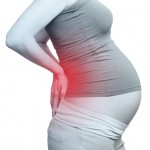 What’s causing my back pain?
What’s causing my back pain?
You can probably blame your growing uterus and hormonal changes for your aching back.
Your expanding uterus shifts your center of gravity and stretches out and weakens your abdominal muscles, changing your posture and putting strain on your back. It may also cause back pain if it’s pressing on a nerve. In addition, the extra weight you’re carrying means more work for your muscles and increased stress on your joints, which is why your back may feel worse at the end of the day.
Who’s most likely to have low back pain during pregnancy?
Not surprisingly, you’re most likely to have low back pain if you’ve had this kind of pain before, either before you got pregnant or during a previous pregnancy. You’re also at higher risk if you’ve lead a very sedentary lifestyle and have poor flexibility and weak back and abdominal muscles.
Carrying twins (or more) increases your odds of having an aching back. Obesity may be a risk factor for developing low back pain during pregnancy, but study results are conflicting.
Taking steps to ease soreness and tension and generally taking good care of yourself can’t hurt. At the very least, you’ll feel better temporarily. Take the time to try these measures:
-

Learn relaxation techniques. They may help you cope with the discomfort and may be especially useful at bedtime if your back pain is just one more thing that makes it hard to get to sleep.
- Try heat or cold. There’s some evidence that heat may provide a bit of short-term relief. Try soaking in a warm (not hot) tub, which can also help you relax. Or place a hot water bottle (or hot pack) on your lower back.Although there’s no hard evidence that cold helps, applying a cold pack is easy to do and worth a try if heat doesn’t work for you.Whether you use heat or cold, cover the pack or bottle with a thin cloth to protect your skin.
- Treat yourself to a massage. Prenatal massage by a trained therapist may provide some relief. If your insurance plan doesn’t cover therapeutic massage and paying for one will strain your finances, you may want to enlist your partner or a friend to give you a gentle backrub – it may not address the underlying problem, but it might help you relax. (Most insurance companies don’t cover massage, though a referral from your caregiver might do the trick. It’s worth looking into.)
Are there other things to try if the above measures don’t help enough?
Yes, but begin by letting your caregiver know if your back pain doesn’t respond to the measures above. She can evaluate your situation, discuss treatment options, and refer you to a specialist, if necessary.
Some options to consider and discuss with your caregiver:
- There’s research suggesting that acupuncture may help reduce the intensity of back pain during pregnancy.
- Some back pain sufferers respond well to physical therapy. Plus, a physical therapist can teach you exercises to do on your own to prevent later episodes of low back pain.
- Some women find that chiropractic care is helpful, though research that’s specific to pregnancy-related back pain is scant
- Your caregiver may suggest trying a “sacral belt.” (For some women, this device seems to help lessen the pain when walking, although for others it doesn’t help at all, and for a few it may even increase pain.)
- If your pain is severe, your caregiver may prescribe pain medication.
Are there symptoms that should prompt an urgent call to my caregiver?
Yes. Call immediately if:
- Your back pain is severe, constant, or getting progressively worse, or if it’s caused by trauma or accompanied by a fever.
- You’ve lost feeling in one or both legs, or you suddenly feel uncoordinated or weak.
- You have a loss of sensation in your buttocks, groin, genital area, or your bladder or anus, which may make it hard to pee or have a bowel movement, or, alternatively, cause incontinence.
- You have low back pain in the late second or third trimester. This can be a sign of preterm labor, particularly if you haven’t had back pain before that.
- You have pain in your lower back or in your side just under your ribs, on one or both sides. This can be a sign of a kidney infection, especially if you have a fever, nausea, or blood in your urine.
Source: www.babycenter.com; 2014.








